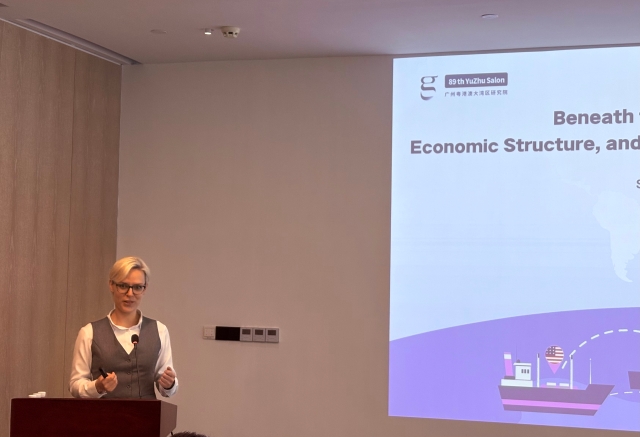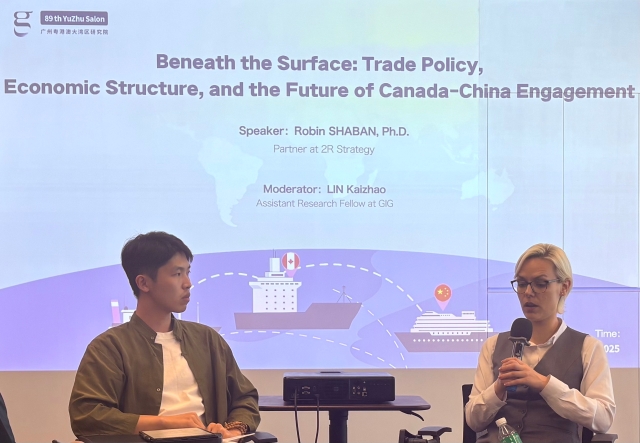"There are some optimistic shifts in Canadians' attitudes toward China," noted Dr. Robin Shaban, Partner at 2R Strategy, a business consulting firm based in Toronto.
The observation came during her lecture titled "Beneath the Surface: Trade Policy, Economic Structure, and the Future of Canada-China Engagement," hosted by the Guangzhou Institute of GBA in Guangzhou on June 10.

Robin Shaban delivers a lecture in Guangzhou on June 10, 2025.
A promising land of crises
For all the advantages that Canada currently possesses, such as high GDP per capita, abundant natural resources for exports, and a strong and stable financial sector for future development, Shaban acknowledged that the country is facing crises, both internal and external.
The productivity crisis tops the internal issues in Canada due to a lack of competition domestically, leading to monopolization in the country.
Despite a robust research ecosystem and a highly educated labor force, Canada struggles to commercialize and transform intellectual property, patents, and copyrights into scalable businesses.
Additionally, the productivity crisis contributes to a housing crisis. As Shaban notes, Canada needs to build 3.5 million new homes by 2030, but is nowhere near the target at present.
Even worse, Canada is experiencing a "Silver Tsunami," as Shaban observes. Owners of small or medium-sized enterprises, at 55 to 75 retirement age, seek to exit their businesses but often lack an exit strategy.
The Canadian Federation of Independent Business estimates that over the next ten years, there will be a $2 trillion asset transfer from business owners at retirement age to new owners.
As for the external crisis, one figure cannot be overlooked—Donald Trump, the man who has exposed the economic and political sovereignty crisis in Canada.
According to Shaban, Canada's economy is over-integrated with the US economy. Data shows that Canada's domestic exports on a customs basis reached 75.9% of these shipments destined for the US in 2024. Imports from the US to Canada also exceed 60% of all its imports.
In this context, "Trump's tariffs have created a significant shock to the Canadian economy," Shaban emphasized.
More importantly, given Trump's threatening remarks about annexing Canada, rising nationalism and anti-American sentiment have emerged. Shaban noted that Canada is forced to re-evaluate and reinvent its national identity and contribution to the world.
According to Shaban, the current push across all policy areas in Canada is focused on sovereignty, both economic and political.

Robin Shaban (R) answers questions from audience at the Q&A of the lecture in Guangzhou on June 10, 2025.
A chance brought by Carney Doctrine ?
In response to Trump's aggression and domestic issues, Shaban noted that Canadian Prime Minister Mark Carney embraces multilateralism and seeks to enhance East-West trade and sustainable finance.
Carney's trade policies, which include trade agreements and foreign direct investment (FDI), serve as evidence of this.
In addition to re-negotiating the Canada-US-Mexico Agreement and the Canada-EU Comprehensive Economic and Trade Agreement, as Shaban points out, there is potential for a free trade agreement with China through the Comprehensive and Progressive Agreement for Trans-Pacific Partnership (CPTPP), reflecting some optimistic shifts in attitudes toward China.
"To be successful, Canada needs a shift in its Indo-Pacific Strategy," she emphasized.
Regarding FDI, Shaban admitted that the Investment Canada Act remains a challenge for foreign companies due to national security concerns.
Despite stringent access to the Canadian market, the stock of FDI in Canada reached over $1,500 billion at the end of 2024. FDI in Canada from China as the ultimate investor country reached $50.1 billion, ranking third after the US and the UK.
Notably, Shaban highlighted nation-building infrastructure projects during Carney's slogan of "build, baby, build" in his victory speech, a promise for Canada to become an energy "superpower."
In Shaban's view, these infrastructure sectors present opportunities for Chinese firms to invest. She listed wind turbines, deep-water ports in the Arctic, icebreaker ships for Arctic navigation, and oil and gas pipelines in Western Canada.
Additionally, she noted that China has the potential to help Canada address its housing crisis by providing materials for building houses.
Three possible scenarios of China-Canada engagement ahead
At the end of her lecture, Shaban projected three scenarios for China-Canada engagement: Pragmatic Partnership, Strategic Separation, and Selective Convergence, reflecting different degrees of collaboration between the two countries.
She cited the rare earths versus chips situation in the China-US trade as an example. From a Canadian perspective, she noted that if Canada is going to build out infrastructure, critical minerals, or other sensitive industries, those industries are fitting into this context.
"We're really not in a position that allows us to realize the wealth of that while maintaining economic sovereignty and engaging in the global economy without a security blanket," she stated.
Babies have their blankets to feel comfortable. "We have our big brother America. He's going to look out for us if someone tries to bully us. It turns out America's bullying us now," she added.
"There's complexity in that trade-off regarding the showdown between China and the US on chips and critical minerals," she concluded.
Reporter: Zhang Ruijun
Photo: Zhang Ruijun
Editor: Yuan Zixiang, James, Shen He
















